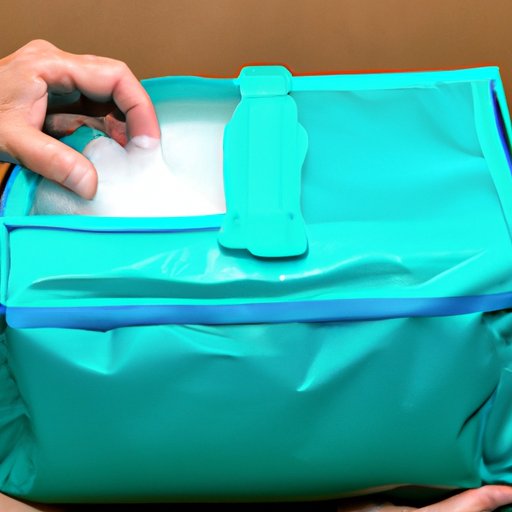Introduction
For those who need to take medication that requires refrigeration, traveling can present a unique challenge. Depending on the type of medication and the location you are traveling to, there are certain steps you should take to ensure your medication stays at the correct temperature during your travels. This article will explore what refrigerated medication is, why refrigeration is important, and detail the necessary steps for safely transporting it.
What is Refrigerated Medication?
Refrigerated medication includes any medication that must be stored in a refrigerator in order to remain effective. These medications are typically heat-sensitive, meaning they can become less effective if exposed to high temperatures. Common examples of refrigerated medications include insulin, biologics, and vaccines.
Why is Refrigeration Important for Medication?
According to a study published in the journal Therapeutics and Clinical Risk Management, “Temperature extremes can significantly alter the therapeutic properties of a drug, leading to reduced efficacy or increased toxicity.” This means that if a medication is not stored properly, it may not work as intended, or could even cause harm. Therefore, it is essential to maintain the proper storage conditions when traveling with refrigerated medication.

Research the Regulations for Refrigerated Medication When Traveling
Before traveling with any type of medication, it is important to research the laws and regulations of the destination country. Different countries have different policies regarding medication, so it is essential to make sure you are aware of any restrictions or requirements before you travel.

Check Local Laws and Regulations
Each country has its own set of rules and regulations for the importation of medication. For example, in some countries, all medications must be declared upon entry, while in others, only certain types of medications require a prescription from a doctor. Before traveling, make sure to check the laws and regulations of the destination country, so you know what is required for bringing medication into the country.
Consider TSA Guidelines
In addition to researching the laws and regulations of the destination country, it is also important to familiarize yourself with the TSA guidelines for carrying medication. According to the TSA website, “medications in liquid or gel form are allowed in carry-on bags in excess of 3.4 ounces in reasonable quantities for the flight.” However, it is important to note that all medications must be declared at the security checkpoint, and that some medications may require additional screening.

Prepare a Plan for Refrigeration of Medication During Travel
Once you have researched the laws and regulations of the destination country and the TSA guidelines, it is important to develop a plan for refrigerating your medication during travel. This plan should include ways to ensure your medication remains at the correct temperature throughout your journey.
Plan Ahead
The first step in creating a plan for refrigerating your medication is to plan ahead. Determine what type of transportation you will be taking and make sure you have access to a refrigerator or other cooling device for the duration of your journey. If possible, try to book a hotel room with a refrigerator, or arrange for a friend or family member to provide access to a refrigerator during your stay.
Make Sure You Have Access to Refrigeration
Even if you have a plan for refrigerating your medication, it is important to make sure you have access to a refrigerator or other cooling device during your travels. For example, if you are flying, make sure your airline offers a refrigerator onboard or that you can purchase a refrigerated meal. If you are driving, consider renting a car with a built-in fridge or packing a cooler with ice packs to keep your medication at the correct temperature.

Pack an Insulated Bag for Transportation of Refrigerated Medication
Once you have a plan for refrigerating your medication, it is important to pack an insulated bag for transporting it. An insulated bag will help keep your medication at the correct temperature, even if you don’t have access to a refrigerator or cooling device.
Choose the Right Bag
When choosing an insulated bag, make sure it is designed specifically for transporting medication. Look for a bag with multiple compartments and pockets to store different types of medication, and make sure it is well-insulated to keep your medication at the correct temperature.
Add Ice Packs or Cooling Packs
In addition to an insulated bag, you should also add ice packs or cooling packs to your bag. Ice packs or cooling packs can help keep your medication at the correct temperature, even if you don’t have access to a refrigerator or cooling device.
Utilize a Cooling Pack or Ice Pack to Keep Medication at the Correct Temperature
When using a cooling pack or ice pack, it is important to choose the right type of pack for your needs. For example, some cooling packs are designed to keep your medication at a specific temperature for a certain amount of time, while others are designed to stay cold for longer periods of time.
Place Packing Strategically
It is also important to place the cooling pack or ice pack strategically in the bag. Make sure it is placed near the medication and make sure it is not too close, as this could cause the medication to become too cold.
Consider Alternate Sources of Refrigeration During Travel
In addition to packing an insulated bag and utilizing a cooling pack or ice pack, it is important to consider alternate sources of refrigeration during travel. Depending on where you are traveling, you may be able to find a hotel or restaurant with a refrigerator, or you may be able to rent a portable cooler.
Look for Hotels with Refrigerators
If you are staying in a hotel during your travels, it is a good idea to look for a hotel with a refrigerator. Many hotels offer refrigerators for an additional fee, and some may even offer them for free. If you are able to find a hotel with a refrigerator, it can be a great way to keep your medication at the correct temperature while you are away from home.
Use Portable Coolers
If you are traveling by car, you may want to consider renting a portable cooler. Portable coolers are small, lightweight, and easy to transport, making them ideal for keeping your medication at the correct temperature while traveling.
Conclusion
Traveling with refrigerated medication can present a challenge, but with proper planning and preparation, it can be done safely and effectively. Researching local laws and regulations, planning ahead for access to refrigeration, packing an insulated bag with cooling packs or ice packs, and considering alternate sources of refrigeration can help ensure your medication stays at the correct temperature during your travels.
By following the steps outlined in this article, you can ensure your refrigerated medication stays safe and cool during your travels. Remember, it is always best to plan ahead, so make sure to take the necessary precautions before embarking on your journey.
(Note: Is this article not meeting your expectations? Do you have knowledge or insights to share? Unlock new opportunities and expand your reach by joining our authors team. Click Registration to join us and share your expertise with our readers.)
